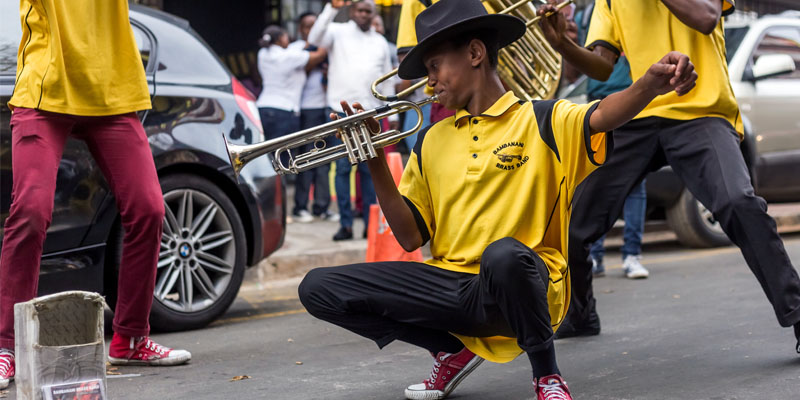South African jazz cultures and the archive
-
Research
- Creativity
- Culture and Communication
Posted on 8 October 2021
The South African jazz scene is one of the most active in the world, but decades of political upheaval means that its history is largely undocumented - and even young South African musicians aren't aware of its influence. Our research has created a permanent archive to ensure this rich musical heritage can be appreciated by everyone.

The issue
A priority for this research is the need to understand and document the musical priorities of jazz musicians in South Africa as opposed to their social and political influences which hitherto have tended to dominate musical analysis.
The research
Researchers undertook 50 detailed interviews with South African musicians, many of which are cleared for public access and now comprise the largest publicly available repository of audio interviews for jazz in South Africa.
A number of key musicians took part in public discussions as well as other groups including teachers, archivists, listening societies, filmmakers, record companies, bloggers, artists and academics.
And one of South Africa’s most influential veteran jazz musicians, Tete Mbambisa, recorded ‘Black Heroes’, his first recorded output in 20 years. This acclaimed solo piano recording was produced by one of the research team and was originally conceived as a means of researching Mbambisa’s compositional technique. It has received significant airplay in South Africa and elsewhere.
The outcome
The research has had a number of impacts in four related archival areas.
It has identified, and addressed, two gaps in the South Africa jazz archive: It highlighted a lack of space given to musicians’ thoughts on the musical aspects of their art and set about creating the largest publicly accessible interview archive featuring South African musicians, focusing on their musical priorities rather than socio-political ones.
It also identified the significant number of musicians who left South Africa during the apartheid years and, in some cases, died before they had a chance to return when democracy was implemented, resulting in a rupture to intergenerational knowledge exchange in the jazz community. Our researchers worked with veteran pianist and composer Tete Mbambisa on notating his music for the first time, which enabled performances with three UK-based musicians, younger South African players and a South African musician now based in Sweden. Concert tours and recorded material have also followed on this research.
The research has increased the public’s awareness in the South African jazz archive by organising a number of public discussion days which included participants from both inside and outside academic and archivist circles, generating debate and increasing the public’s understanding of musical heritage. It has also provided a link between the archive and education by introducing students from the University of Fort Hare, the University of KwaZulu Natal, the University of Cape Town, Stellenbosch University and the University of York to the archival work. Public concerts have also taken place in York and Cape Town.
Finally, the research has increased public access to the archive with the creation of a Facebook page to share research from South African Jazz Cultures. This now has over 2,500 followers with posts relating to research regularly reaching up to 1,500 readers.
The text of this article is licensed under a Creative Commons Licence. You're free to republish it, as long as you link back to this page and credit us.

Jonathan Eato
Jonathan Eato is a composer and saxophone player with interests in a wide range of contemporary musics: jazz, improvisation, South African popular music, interdisciplinary performance, music and postcoloniality, and music for dance.
Explore more research

A research project needed to spot trees on historic ordnance survey maps, so colleagues in computer science found a solution.

We’re using gaming technology to ensure prospective teachers are fully prepared for their careers.

A low cost, high-accuracy device, could play a large part in the NHS's 'virtual wards'.
